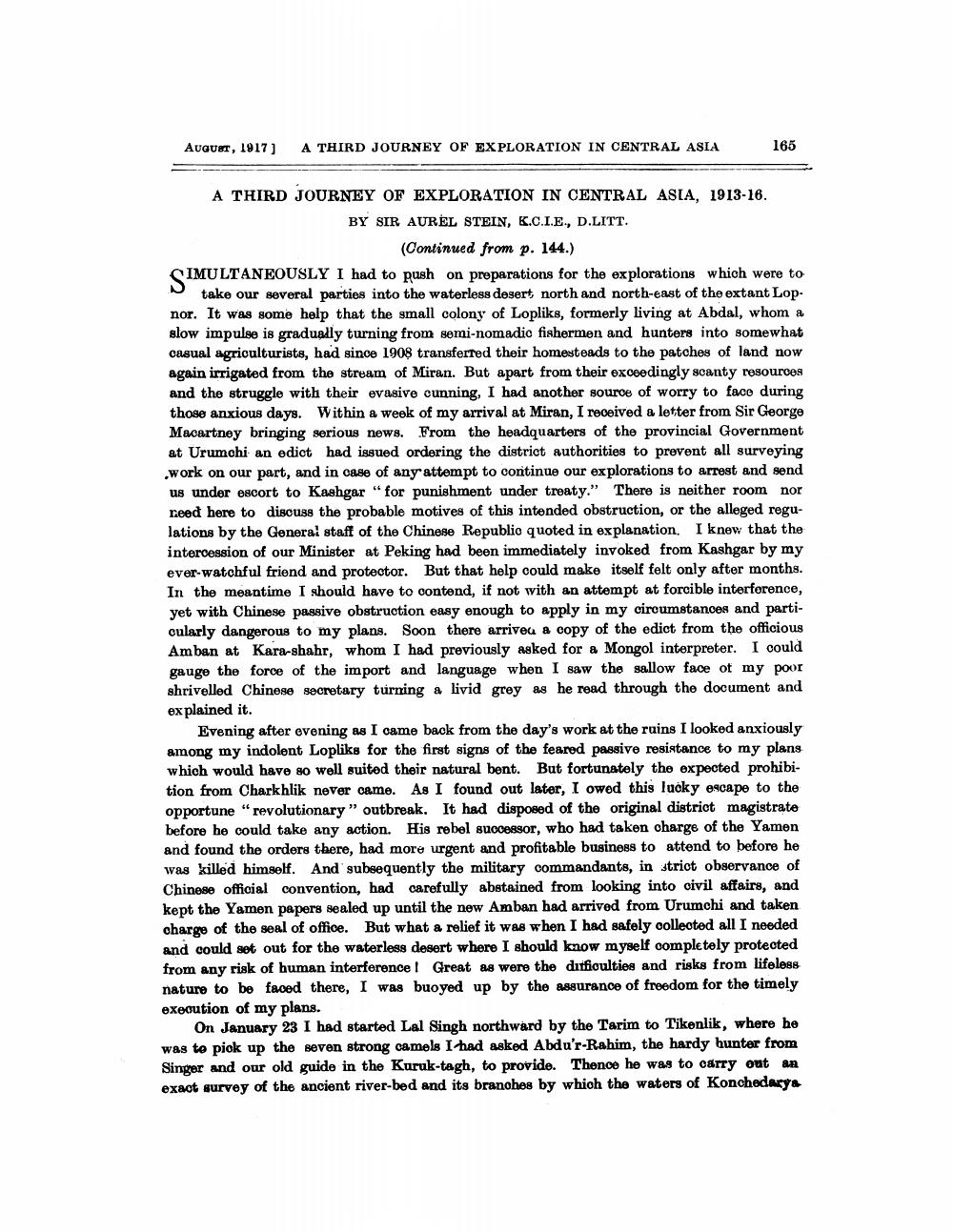________________
AUGUST, 1917] A THIRD JOURNEY OF EXPLORATION IN CENTRAL ASIA
165
A THIRD JOURNEY OF EXPLORATION IN CENTRAL ASIA, 1913-16. BY SIR AUREL STEIN, K.C.I.E., D.LITT.
(Continued from p. 144.)
SIMU
IMULTANEOUSLY I had to push on preparations for the explorations which were to take our several parties into the waterless desert, north and north-east of the extant Lopnor. It was some help that the small colony of Lopliks, formerly living at Abdal, whom a slow impulse is gradually turning from semi-nomadic fishermen and hunters into somewhat casual agriculturists, had since 1908 transferred their homesteads to the patches of land now again irrigated from the stream of Miran. But apart from their exceedingly scanty resources and the struggle with their evasive cunning, I had another source of worry to face during those anxious days. Within a week of my arrival at Miran, I received a letter from Sir George Macartney bringing serious news. From the headquarters of the provincial Government at Urumchi an edict had issued ordering the district authorities to prevent all surveying work on our part, and in case of any attempt to continue our explorations to arrest and send us under escort to Kashgar "for punishment under treaty." There is neither room nor reed here to discuss the probable motives of this intended obstruction, or the alleged regulations by the General staff of the Chinese Republic quoted in explanation. I knew that the intercession of our Minister at Peking had been immediately invoked from Kashgar by my ever-watchful friend and protector. But that help could make itself felt only after months. In the meantime I should have to contend, if not with an attempt at forcible interference, yet with Chinese passive obstruction easy enough to apply in my circumstances and particularly dangerous to my plans. Soon there arrived a copy of the edict from the officious Amban at Kara-shahr, whom I had previously asked for a Mongol interpreter. I could gauge the force of the import and language when I saw the sallow face of my poor shrivelled Chinese secretary turning a livid grey as he read through the document and explained it.
Evening after evening as I came back from the day's work at the ruins I looked anxiously among my indolent Lopliks for the first signs of the feared passive resistance to my plans which would have so well suited their natural bent. But fortunately the expected prohibition from Charkhlik never came. As I found out later, I owed this lucky escape to the opportune "revolutionary" outbreak. It had disposed of the original district magistrate before he could take any action. His rebel successor, who had taken charge of the Yamen and found the orders there, had more urgent and profitable business to attend to before he was killed himself. And subsequently the military commandants, in strict observance of Chinese official convention, had carefully abstained from looking into civil affairs, and kept the Yamen papers sealed up until the new Amban had arrived from Urumchi and taken charge of the seal of office. But what a relief it was when I had safely collected all I needed and could set out for the waterless desert where I should know myself completely protected from any risk of human interference! Great as were the difficulties and risks from lifeless nature to be faced there, I was buoyed up by the assurance of freedom for the timely execution of my plans.
On January 23 I had started Lal Singh northward by the Tarim to Tikenlik, where he was to pick up the seven strong camels I had asked Abdu'r-Rahim, the hardy hunter from Singer and our old guide in the Kuruk-tagh, to provide. Thence he was to carry out an exact survey of the ancient river-bed and its branches by which the waters of Konchedarya




